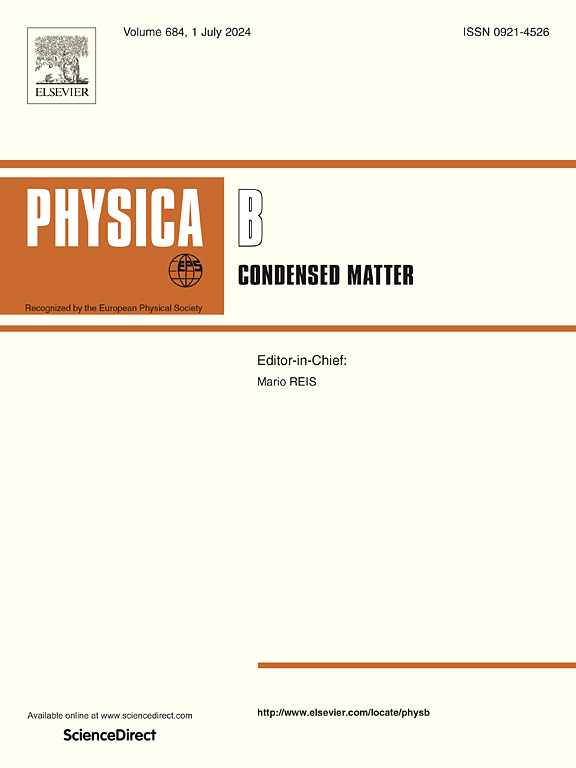基于 ZnMn2O4 微球的超灵敏异丙醇气体传感器
IF 2.8
3区 物理与天体物理
Q2 PHYSICS, CONDENSED MATTER
引用次数: 0
摘要
采用不同浓度的尿素(ZU),通过一步水热法制备了纯多孔 ZnMn2O4 微球。利用 XRD、FESEM、PL、UV-Vis、FT-IR 和 EDS 等多种技术研究了所得样品的结构和形态特性。结果表明,所获得的样品纯度较高,通过改变尿素的浓度,微球表面变得粗糙,这有利于实现气体传感特性。然后,研究了制作的传感器层在不同工作温度下对不同浓度异丙醇蒸汽的气体传感器性能。气体传感结果证实,ZU 薄膜对 ZU3(500 ppm 异丙醇)具有 5.54 的高响应,对 ZU2(400 ppm)和 ZU3(300 ppm)具有 2.5 秒的极快响应时间,并且在相对较低的温度下与 DMF 相比具有约 107 % 的出色选择性。此外,还深入讨论了气体传感机制。本文章由计算机程序翻译,如有差异,请以英文原文为准。
A stunning sensitive isopropanol gas sensor based on ZnMn2O4 microspheres
The pure porous ZnMn2O4 microspheres were prepared by a one-step hydrothermal technique with different concentrations of Urea (ZU). Various techniques including XRD, FESEM, PL, UV–Vis, FT-IR and EDS were used to study the structural and morphological properties of the obtained samples. The results show that the obtained samples have high purity and by changing the concentration of urea, the microspheres have rough surfaces, which is useful for gas sensing properties. Then, the gas sensor properties of the fabricated sensor layers were investigated for isopropanol vapor with different concentrations at different working temperatures. Gas sensing results confirm that the ZU films exhibit a high response of 5.54 for ZU3 (500 ppm isopropanol), a very fast response time of 2.5 s for ZU2 (400 ppm) and ZU3 (300 ppm), and excellent selectivity with a difference of approximately 107 % compared to DMF at a relatively low temperature. In addition, the gas sensing mechanism was also thoroughly discussed.
求助全文
通过发布文献求助,成功后即可免费获取论文全文。
去求助
来源期刊

Physica B-condensed Matter
物理-物理:凝聚态物理
CiteScore
4.90
自引率
7.10%
发文量
703
审稿时长
44 days
期刊介绍:
Physica B: Condensed Matter comprises all condensed matter and material physics that involve theoretical, computational and experimental work.
Papers should contain further developments and a proper discussion on the physics of experimental or theoretical results in one of the following areas:
-Magnetism
-Materials physics
-Nanostructures and nanomaterials
-Optics and optical materials
-Quantum materials
-Semiconductors
-Strongly correlated systems
-Superconductivity
-Surfaces and interfaces
 求助内容:
求助内容: 应助结果提醒方式:
应助结果提醒方式:


